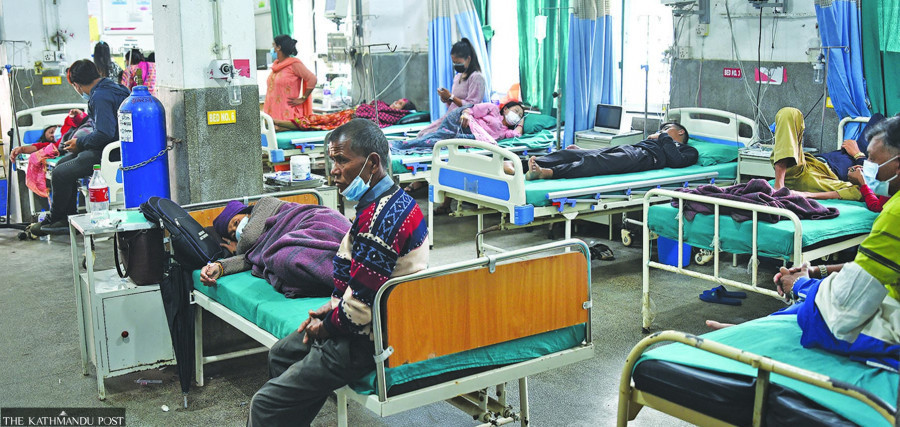Health
Health workers in hospital emergencies to receive basic life support training
Medical regulator working to make a 100-mark test mandatory for doctor licence renewal.
Post Report
In a bid to reduce patient deaths in hospital emergencies, the Ministry of Health and Population has started providing basic life support training to health workers.
Officials hope that ongoing deaths in hospital emergencies would come down significantly once health workers were trained in basic life support.
“Around 900 health workers, including medical doctors, nurses, paramedics, and health assistants, have already been trained with basic life support skills,” said Dr Prakash Budhathoky, spokesman for the ministry. “The remaining health workers will receive training in the new fiscal year.”
Basic life support is a type of care that first responders, who could be health workers serving in hospital emergencies, provide to anyone suffering from cardiac arrest, respiratory distress and other life-threatening conditions.
Experts say basic life support is very crucial in emergency situations—cardiac arrest, and trauma cases, among others. The procedure includes recognising and responding to emergency situations, seeking help, performing cardiopulmonary resuscitation (CPR) and providing breathing assistance.
Chances of survival will be high if trained health workers respond to the cases first.
Officials said that the number of patient deaths in emergencies could be reduced significantly if all health workers serving in hospital emergencies were trained with basic life support skills.
“We will also encourage provincial governments to provide basic life support skills to health workers serving in provincial hospitals and health centres run by local units,” said Budhathoky. “Those serving in emergencies at private health facilities will also get this training.”
Doctors say that basic life support skills can be effective in saving lives when provided promptly and correctly. Health officials say many health workers serving in emergencies of health facilities, especially those hired newly, do not have basic life support skills.
Meanwhile, the Nepal Medical Council, the national regulatory body for medical doctors, said it is working to make continuous professional development training mandatory for licence renewal.
“Doctors must pass a 100-mark test on ethics, basic life support, communication, infection control and the rational use of medicines,” said Dr Bishwa Raj Dawadi, the council member. “Gone are the days when one would remain a doctor simply by obtaining a medical degree. They must be updated with skills and new knowledge.”
A few years ago, the Council made professional development training mandatory for all medical doctors. Failure to attend the course will result in non-renewal of the medical licence.
Medical doctors undergo the training regularly, and the council assesses its effectiveness every five years to ensure that doctors providing health care services are updated in their profession.
Professional training involves processes that act as refresher courses to update and enhance a doctor’s knowledge, skills, and experience, even after the completion of their formal degree. It can take the form of fellowships, seminars, workshops, conferences, and continuous medical education.
The NMC said that CPD (continuous professional development training) is a lifelong process of learning and updating professional skills.
Doctors also need to take effective communication skills training so that they can communicate with the families and relatives of patients about their condition and the treatment process, including surgeries. In recent years, there have been reports of scuffles between hospitals/doctors and the kin of patients in the event of a patient’s death. At times, situations have taken a nasty turn in which doctors have been manhandled and hospitals vandalised.
The medical council said that implementation of the code of ethics has been a challenge thus far and that training such as the CPD could help in its effective enforcement.
One of the problems the NMC is facing currently is its inability to prevent doctors and health institutions from advertising their skills and profession using mass media, which, according to the NMC, is against the code of ethics.




 9.83°C Kathmandu
9.83°C Kathmandu














